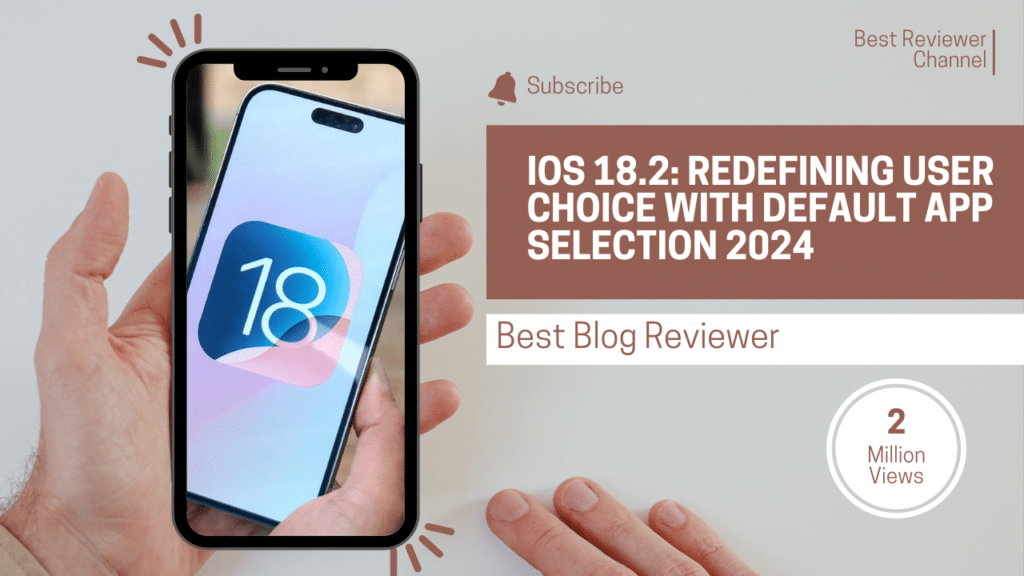Let’s talk about iOS 18.2. Apple has long been known for its tight ecosystem, where hardware and software work in harmony to provide a seamless user experience. However, this tight integration has often been criticized for its lack of flexibility, particularly when it comes to default apps. With the release of iOS 18.2, Apple has taken a significant step towards addressing these concerns by allowing users to change their default phone and messaging apps. This change marks a pivotal moment in the evolution of iOS, providing users with more control and personalization than ever before.
Go here if you want to know about Google Pixel 9: Unprecedented Black Friday Deals 2024
The Journey to Greater Customization
Here is my honest review about iOS 18.2
For years, iPhone users have been accustomed to using the built-in Phone and Messages apps by default. While these apps are robust and well-designed, they are not necessarily the best fit for everyone. The limitation meant that users who preferred third-party apps missed out on additional functionality or features that better suited their needs. Apple began loosening its grip on default apps with iOS 14, which allowed users to change their default browser and email apps. With iOS 18.2, this flexibility extends further, embracing third-party phone and messaging apps.
Enhancing the User Experience
The ability to change default apps is more than just a nod to customization; it enhances the overall user experience. By allowing users to set their preferred apps as default, Apple is acknowledging the diverse needs and preferences of its user base. This change enables users to select apps that offer features like enhanced security, unique interface designs, or superior integration with other services they use.
Freedom of Choice
The freedom to choose default apps empowers users to tailor their devices to their personal preferences. For instance, a user who frequently travels internationally might prefer a messaging app with better global connectivity and lower international calling rates. Another user might prioritize privacy and choose an app renowned for its encryption capabilities. By providing this choice, iOS 18.2 ensures that every user can configure their device to align with their lifestyle and values.
The Impact on Developers
This update also significantly impacts app developers, offering them new opportunities and challenges. Developers now have the incentive to innovate and improve their apps to compete for the coveted spot of being a user’s default app. This competitive landscape is likely to lead to a surge in creativity and functionality as developers strive to offer unique features that set their apps apart.
Encouraging Innovation
With the ability to become a default app, developers are motivated to think outside the box and introduce features that might not have been possible or necessary before. This could lead to new advancements in technology, such as improved voice recognition for phone apps or more interactive messaging features. As developers push the boundaries, users stand to benefit from more sophisticated, user-friendly applications.
Navigating the Change
While the introduction of customizable default apps is a welcome change, it does come with its own set of challenges. Users who are less tech-savvy may find the process of changing default apps confusing or intimidating. To mitigate potential issues, Apple has introduced a straightforward process within the Settings menu, complete with guided instructions and user-friendly prompts.

Step-by-Step Guidance
To change your default phone or messaging app in iOS 18.2, follow these simple steps:
- Open the Settings app on your iPhone.
- Scroll down and select the app category you wish to change, either Phone or Messages.
- Tap on Default App.
- Browse through the list of installed apps that support this feature.
- Select the app you wish to set as default.
These steps are designed to make the transition as smooth as possible, ensuring that all users, regardless of their technical expertise, can take full advantage of the new customization options.
Privacy and Security Considerations
As with any change to software that handles sensitive information, privacy and security remain top priorities. Apple has maintained its commitment to user privacy by implementing stringent guidelines that third-party apps must adhere to in order to qualify as default options. These guidelines include robust encryption standards and transparency in data handling practices.
Maintaining Trust
By enforcing these security measures, Apple ensures that users can trust their chosen apps with personal data such as call logs, messages, and contacts. This commitment to privacy not only protects users but also reinforces Apple’s reputation as a company that values and safeguards its customers’ information.
The Future of iOS
The introduction of customizable default apps in iOS 18.2 is a significant milestone in the operating system’s evolution. It reflects a broader trend within Apple towards greater openness and flexibility, aligning with user demands for more control over their devices. This change is likely just the beginning of a series of updates aimed at enhancing user choice and personalization.
Looking Ahead
As Apple continues to innovate and adapt, users can anticipate further advancements that prioritize customization and user-centric design. Future updates may expand default app options to include other categories, such as maps, virtual assistants, or music players, further empowering users to curate their digital experience.
Conclusion
iOS 18.2 represents a transformative shift in Apple’s approach to user customization. By allowing users to change their default phone and messaging apps, Apple acknowledges the importance of choice and personalization in today’s digital landscape. This update not only enhances the user experience but also encourages innovation within the app development community. As Apple continues to evolve, users can look forward to a more flexible, personalized approach to their mobile experience, setting a new standard for operating systems worldwide.
Leave a Reply Cancel reply